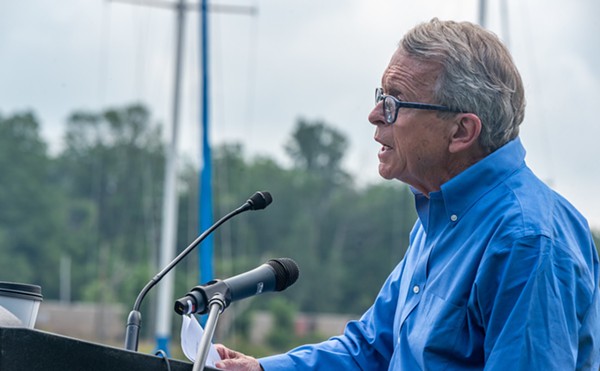Q Deal Progresses: County Council Grovels Before Cavs, Signals Ultimate Support
By Sam Allard on Wed, Mar 15, 2017 at 2:44 pm
[
{
"name": "Ad - NativeInline - Injected",
"component": "38482495",
"insertPoint": "3",
"requiredCountToDisplay": "5"
},{
"name": "Real 1 Player (r2) - Inline",
"component": "38482494",
"insertPoint": "2/3",
"requiredCountToDisplay": "9"
}
]
In what likely served as a preview of the official vote on the Quicken Loans Arena renovation deal, Cuyahoga County Council voted 8-2 Tuesday to move an amended version of their resolution to its next and final stage.
The resolution authorizes the County to sell municipal bonds that will generate $140 million for the project. The final costs of the renovation, however, are as of yet unknown. Cavs' President Len Komoroski has said that roughly 2/3 of the construction plans are complete, but $140 million has been the estimated cost ever since the team first publicly floated the deal more than two years ago. The dramatic exterior upgrade will include a glass atrium and improved ingress/egress areas at the arena. Komoroski has said that the renovation is vital to allow the Q to continue to be competitive "not this year or next year, but in the short-term years ahead."
(Cleveland.com published a detailed list of the project's current estimated costs.)
Councilman Jack Schron and Councilwoman Nan Baker dissented, voting to keep the measure in committee. Schron argued, as he has before, that it would be fiscally irresponsible to approve the resolution without first grappling with the effects of the state budget, which won't be released until June. He urged his colleagues in a summation yesterday to "wait 90 days."
Councilwoman Nan Baker, echoing comments she made at the Feb. 28 meeting, asked that the Cavaliers assume responsibility for the financing of the project. Right now, the public contributions include upwards of $40 million in interest payments. Baker's contention was that Cavs' owner Dan Gilbert, who leads and lords over an empire called Quicken Loans, ought to be able — in fact uniquely qualified — to sort out the financing of this project on his own. For Baker, a $70 million contribution on a tenant upgrade would be much more stomachable than $160 million, the current all-in estimate of the public contribution.
Councilwoman Yvonne Conwell was absent. She was one of three councilpeople who attended a Greater Cleveland Congregations meeting last Thursday and pledged to work to delay the vote at that gathering.
The measure will need a majority vote (6-5) for approval at council's March 28 meeting. Given this prelude, which featured the balance of council chastising public attendees for insufficient pressure on the state legislature and celebrating existing attributes of the Q — its surfeit of annual events, its higher-than-average percentage of minority staffing — voters can expect a council vote of either 8-3 or 9-2 in two weeks' time.
The Proceedings:
The centerpiece of yesterday's meeting was a financial deep-dive into the deal's impact on the county general fund. Though "no new taxes" will be created to support the project — a selling point that County Executive Armond Budish and Cleveland.com take pains to include at every mention of the deal — the impact on the general fund is "not immaterial," as Dale Miller put it a few weeks back.
Indeed.
Miller led a detailed Q&A with county budget Director Maggie Keenan, who, with only a year-and-a-half of county employment under her belt, demonstrated a deeper and more nuanced understanding of the county's financial picture than the county's own financial adviser, Tim Offtermatt, who until very recently served as board chairman and CFO of Gateway Development Corp., the Cavs' landlord. Among the members of county council, only Jack Schron has managed to be bothered by the fact that during the deal's extensive private deliberations, (about which little is known), Offtermatt was negotiating on behalf of the Cavaliers.
Keenan's informed opinion was basically the following: Though the impact of the project on the General Fund is significant — $41.9 million - $54.6 million over the course of the agreement — the effect on actual operating dollars is modest. The largest share ($18.1 million, in chunks of $1.5 million per year) will come from the portion of the 0.25-percent sales tax that has been segregated for the Global Center for Health Innovation and the Convention Center.
Keenan also estimated an annual hit of $24-25 million on the county budget caused by the loss of tax revenue from Medicaid managed care services. It was on the strength of this projection that some county councilpeople felt they didn't need to wait for the actual state budget to be released. Though this was merely an estimate of the effects of that particular tax. It remains to be seen what effects other cuts may have.
In a broader Q&A that followed Keenan's presentation, councilpeople asked Len Komoroski to re-state known facts about the Q. The arena's solid track record with respect to minority hiring (34 percent full-time / 44 percent part-time) was conveyed as a justification for the $160 million subsidy (a connection Scene is still hard-pressed to triangulate. Is the subsidy being interpreted, in other words, as a reward for good behavior?) Councilman Pernel Jones, just for example, made several statements framed as questions concerning the renovation project's inclusion goals. Law Director Robert Triozzi assured Jones that he would be provided with a "dashboard" of numbers on those goals, which would include a rundown of available apprenticeships. Jones' eventual support appeared to hinge on this assurance.
Councilman Miller, whom County Executive Armond Budish spoke with privately before the meeting, was rumored by council staff to be in support of the deal provided he won support of his amendment to the resolution. His amendment concerned a reserve fund that will be created as part of the project. He wanted the funds in that reserve to accumulate until 2020 — to prepare for a theoretical Indians' stadium upgrade — instead of being redistributed at the end of every year. Miller noted that the amendment had already been discussed with Budish and the Cavaliers and had their support. Council followed suit. As such, Miller walked back his GCC pledge to delay the vote and voted in favor of the deal.
One of the more curious revelations during the Q&A concerned City Council. Jack Schron said that the Cavaliers wouldn't be able to move forward until both the County and the City approve the deal, which is of course true. (The City's contribution, which will come from a portion of the admissions tax, is in fact quite a bit larger than the county's.) But Komoroski said it was his understanding — obtained via Council President Kevin Kelley — that City Council would be approving the deal on roughly the same schedule as the County.
That would certainly be a surprise to City Council, who have yet to see a shred of documentation or hear one sentence of testimony on the proposal. Though city councilmembers are quaking in their boots at the thought of opposing the Cavs and the Greater Cleveland Partnership — rumor has it that the city's corporate leadership (and political donor class) will retaliate against any council member who opposes the deal — their constituents will likely be more opposed than countywide constituents. That makes sense. City residents don't typically see the benefits of the arena, which was nonetheless initially billed as "Cleveland's Living Room." Via a presentation by Komoroski: At Cavs' games, only 10 percent of attendees are Cleveland residents; at other Q events, only 5 percent of attendees live in the city.
Council President Kevin Kelley did not immediately respond to questions about the council's upcoming meeting schedule.
[UPDATE 3:50 p.m. 3/15: Kelley said the plan is to introduce the city's legislation at Monday's (3/20) council meeting. The resolution would then be discussed the following Tuesday (3/28) at the Development, Planning and Sustainability Committee meeting, chaired by Anthony Brancatelli. As is standard, the resolution would then be sent to the Finance Committee on a subsequent Monday.
Kelley also said he doubts the rumors about threats from the GCP.
"If you're an elected official, you shouldn't be worried about that," Kelley said. "You should do what's right."
Additionally, on the subject of the deal writ large, he said that it would be "irresponsible not to consider the cost of doing nothing."]
But City Councilman Mike Polensek, who opposes the deal, said in a candid conversation Monday that he didn't have much confidence in the moral fortitude of his colleagues. In fact he called them "Pillsbury Doughboys."
The resolution authorizes the County to sell municipal bonds that will generate $140 million for the project. The final costs of the renovation, however, are as of yet unknown. Cavs' President Len Komoroski has said that roughly 2/3 of the construction plans are complete, but $140 million has been the estimated cost ever since the team first publicly floated the deal more than two years ago. The dramatic exterior upgrade will include a glass atrium and improved ingress/egress areas at the arena. Komoroski has said that the renovation is vital to allow the Q to continue to be competitive "not this year or next year, but in the short-term years ahead."
(Cleveland.com published a detailed list of the project's current estimated costs.)
Councilman Jack Schron and Councilwoman Nan Baker dissented, voting to keep the measure in committee. Schron argued, as he has before, that it would be fiscally irresponsible to approve the resolution without first grappling with the effects of the state budget, which won't be released until June. He urged his colleagues in a summation yesterday to "wait 90 days."
Councilwoman Nan Baker, echoing comments she made at the Feb. 28 meeting, asked that the Cavaliers assume responsibility for the financing of the project. Right now, the public contributions include upwards of $40 million in interest payments. Baker's contention was that Cavs' owner Dan Gilbert, who leads and lords over an empire called Quicken Loans, ought to be able — in fact uniquely qualified — to sort out the financing of this project on his own. For Baker, a $70 million contribution on a tenant upgrade would be much more stomachable than $160 million, the current all-in estimate of the public contribution.
Councilwoman Yvonne Conwell was absent. She was one of three councilpeople who attended a Greater Cleveland Congregations meeting last Thursday and pledged to work to delay the vote at that gathering.
The measure will need a majority vote (6-5) for approval at council's March 28 meeting. Given this prelude, which featured the balance of council chastising public attendees for insufficient pressure on the state legislature and celebrating existing attributes of the Q — its surfeit of annual events, its higher-than-average percentage of minority staffing — voters can expect a council vote of either 8-3 or 9-2 in two weeks' time.
The Proceedings:
The centerpiece of yesterday's meeting was a financial deep-dive into the deal's impact on the county general fund. Though "no new taxes" will be created to support the project — a selling point that County Executive Armond Budish and Cleveland.com take pains to include at every mention of the deal — the impact on the general fund is "not immaterial," as Dale Miller put it a few weeks back.
Indeed.
Miller led a detailed Q&A with county budget Director Maggie Keenan, who, with only a year-and-a-half of county employment under her belt, demonstrated a deeper and more nuanced understanding of the county's financial picture than the county's own financial adviser, Tim Offtermatt, who until very recently served as board chairman and CFO of Gateway Development Corp., the Cavs' landlord. Among the members of county council, only Jack Schron has managed to be bothered by the fact that during the deal's extensive private deliberations, (about which little is known), Offtermatt was negotiating on behalf of the Cavaliers.
Keenan's informed opinion was basically the following: Though the impact of the project on the General Fund is significant — $41.9 million - $54.6 million over the course of the agreement — the effect on actual operating dollars is modest. The largest share ($18.1 million, in chunks of $1.5 million per year) will come from the portion of the 0.25-percent sales tax that has been segregated for the Global Center for Health Innovation and the Convention Center.
Keenan also estimated an annual hit of $24-25 million on the county budget caused by the loss of tax revenue from Medicaid managed care services. It was on the strength of this projection that some county councilpeople felt they didn't need to wait for the actual state budget to be released. Though this was merely an estimate of the effects of that particular tax. It remains to be seen what effects other cuts may have.
In a broader Q&A that followed Keenan's presentation, councilpeople asked Len Komoroski to re-state known facts about the Q. The arena's solid track record with respect to minority hiring (34 percent full-time / 44 percent part-time) was conveyed as a justification for the $160 million subsidy (a connection Scene is still hard-pressed to triangulate. Is the subsidy being interpreted, in other words, as a reward for good behavior?) Councilman Pernel Jones, just for example, made several statements framed as questions concerning the renovation project's inclusion goals. Law Director Robert Triozzi assured Jones that he would be provided with a "dashboard" of numbers on those goals, which would include a rundown of available apprenticeships. Jones' eventual support appeared to hinge on this assurance.
Councilman Miller, whom County Executive Armond Budish spoke with privately before the meeting, was rumored by council staff to be in support of the deal provided he won support of his amendment to the resolution. His amendment concerned a reserve fund that will be created as part of the project. He wanted the funds in that reserve to accumulate until 2020 — to prepare for a theoretical Indians' stadium upgrade — instead of being redistributed at the end of every year. Miller noted that the amendment had already been discussed with Budish and the Cavaliers and had their support. Council followed suit. As such, Miller walked back his GCC pledge to delay the vote and voted in favor of the deal.
One of the more curious revelations during the Q&A concerned City Council. Jack Schron said that the Cavaliers wouldn't be able to move forward until both the County and the City approve the deal, which is of course true. (The City's contribution, which will come from a portion of the admissions tax, is in fact quite a bit larger than the county's.) But Komoroski said it was his understanding — obtained via Council President Kevin Kelley — that City Council would be approving the deal on roughly the same schedule as the County.
That would certainly be a surprise to City Council, who have yet to see a shred of documentation or hear one sentence of testimony on the proposal. Though city councilmembers are quaking in their boots at the thought of opposing the Cavs and the Greater Cleveland Partnership — rumor has it that the city's corporate leadership (and political donor class) will retaliate against any council member who opposes the deal — their constituents will likely be more opposed than countywide constituents. That makes sense. City residents don't typically see the benefits of the arena, which was nonetheless initially billed as "Cleveland's Living Room." Via a presentation by Komoroski: At Cavs' games, only 10 percent of attendees are Cleveland residents; at other Q events, only 5 percent of attendees live in the city.
Council President Kevin Kelley did not immediately respond to questions about the council's upcoming meeting schedule.
[UPDATE 3:50 p.m. 3/15: Kelley said the plan is to introduce the city's legislation at Monday's (3/20) council meeting. The resolution would then be discussed the following Tuesday (3/28) at the Development, Planning and Sustainability Committee meeting, chaired by Anthony Brancatelli. As is standard, the resolution would then be sent to the Finance Committee on a subsequent Monday.
Kelley also said he doubts the rumors about threats from the GCP.
"If you're an elected official, you shouldn't be worried about that," Kelley said. "You should do what's right."
Additionally, on the subject of the deal writ large, he said that it would be "irresponsible not to consider the cost of doing nothing."]
But City Councilman Mike Polensek, who opposes the deal, said in a candid conversation Monday that he didn't have much confidence in the moral fortitude of his colleagues. In fact he called them "Pillsbury Doughboys."
SCENE Supporters make it possible to tell the Cleveland stories you won’t find elsewhere.
Become a supporter today.
About The Author
Sam Allard
Sam Allard is the Senior Writer at Scene, in which capacity he covers politics and power and writes about movies when time permits. He's a graduate of the Medill School of Journalism at Northwestern University and the NEOMFA at Cleveland State. Prior to joining Scene, he was encamped in Sarajevo, Bosnia, on an...
Scroll to read more Cleveland News articles
Newsletters
Join Cleveland Scene Newsletters
Subscribe now to get the latest news delivered right to your inbox.













